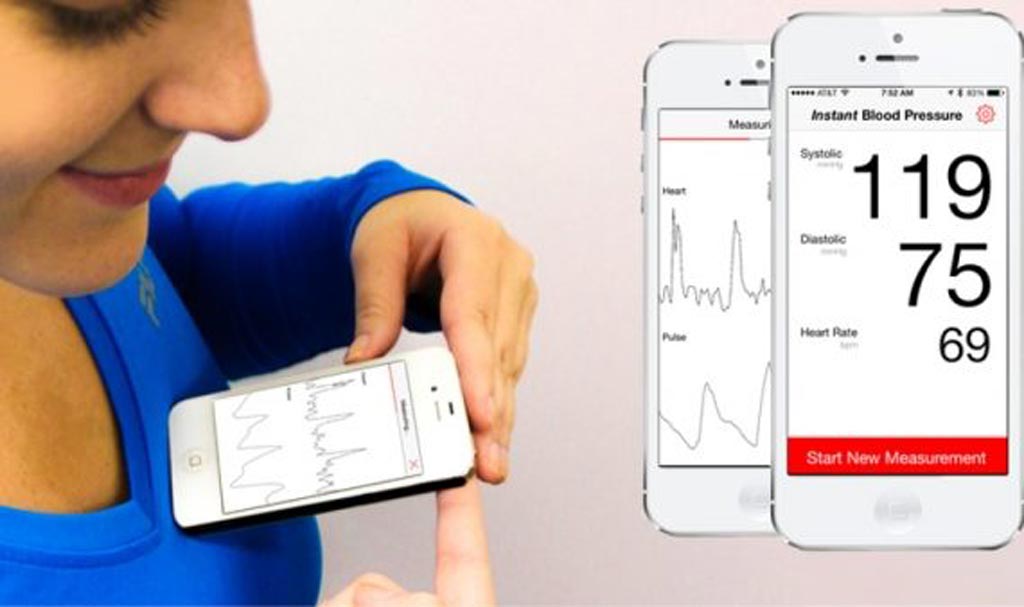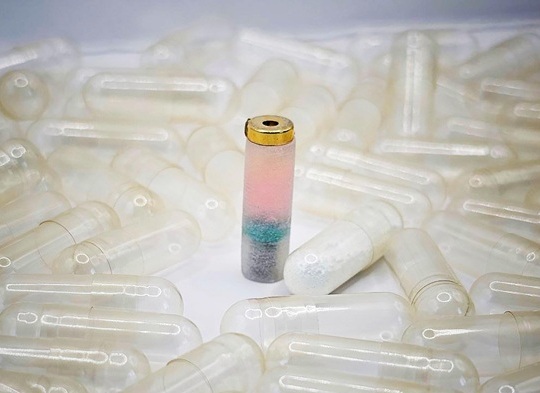Consumer Ratings Do Not Reflect Medical App Accuracy
|
By HospiMedica International staff writers Posted on 20 Jun 2018 |

Image: The now-withdrawn IBP app claimed to accurately measure blood pressure (Photo courtesy of AuraLife).
A new study suggests that positive user reviews, comments, and ratings of popular medical apps do not necessarily mean that they actually work.
Researchers at the University of Vermont (UVM, Burlington, USA), Johns Hopkins University (JHU; Baltimore, MD, USA), and other institutions conducted a study of all user reviews of the now-defunct AuraLife Instant Blood Pressure (IBP) app in order to examine if they correctly reflected the proven inaccuracy of the unregulated blood pressure (BP) measuring app, to understand the drivers for high and low ratings, and to understand if company disclaimers prevented medical use.
To do so, 261 iTunes app reviews for IBP were downloaded and assessed for themes by two reviewers, with summary statistics for themes tabulated with their associated star ratings. The average star rating of the latest version of the app was four out of five stars, and 59% of the reviews assigned the app five stars. Commentary praising the accuracy of the app based on anecdotal experience comprised 42% of the reviews, and 10% of the reviews mention inaccuracy. Six reviews came from people who claimed to be health care professionals, who gave an average rating of 4.2 stars out of five.
While the IBP app included a disclaimer that it shouldn't be used as a medical device and is intended for recreational purposes only, 24 reviews (10%) claimed to use the app for medical purposes, with 11 people using it to manage their high BP treatments, one using it to manage kidney disease, and another using it to monitor BP after a heart transplant. Eleven reviews came from people who said their health care provider approved of the app. Two people said professionals disapproved of the app, and gave a one-star rating. The study was published on June 7, 2018, in the Journal of the American Medical Informatics Association.
“People tend to trust user reviews when shopping online and use them to decide which products to purchase, but that doesn't cut it for medical apps. There are certain thresholds of accuracy that need to be maintained, and a five-star rating doesn't replace clinical validation studies and FDA review,” said study author Timothy Plante, MD, MHS, of the University of Vermont. “Our take-home message to health care providers is to make sure you hold apps to the highest standards, and not just give out recommendations willy-nilly for apps that you think are neat.”
The IBP app sold for USD 4.99 on iTunes and was downloaded 140,000 times before it was withdrawn. It ranked among the best-selling apps on all of iTunes for much of its stretch on the app store. After the app was withdrawn and following the study, the U.S. Federal Trade Commission settled with AuraLife for USD 600,000, with payment suspended for lack of funds in the company. Many other medical apps are still available for consumers, some downloading as many as 1,000,000 times each.
Related Links:
University of Vermont
Johns Hopkins University
Researchers at the University of Vermont (UVM, Burlington, USA), Johns Hopkins University (JHU; Baltimore, MD, USA), and other institutions conducted a study of all user reviews of the now-defunct AuraLife Instant Blood Pressure (IBP) app in order to examine if they correctly reflected the proven inaccuracy of the unregulated blood pressure (BP) measuring app, to understand the drivers for high and low ratings, and to understand if company disclaimers prevented medical use.
To do so, 261 iTunes app reviews for IBP were downloaded and assessed for themes by two reviewers, with summary statistics for themes tabulated with their associated star ratings. The average star rating of the latest version of the app was four out of five stars, and 59% of the reviews assigned the app five stars. Commentary praising the accuracy of the app based on anecdotal experience comprised 42% of the reviews, and 10% of the reviews mention inaccuracy. Six reviews came from people who claimed to be health care professionals, who gave an average rating of 4.2 stars out of five.
While the IBP app included a disclaimer that it shouldn't be used as a medical device and is intended for recreational purposes only, 24 reviews (10%) claimed to use the app for medical purposes, with 11 people using it to manage their high BP treatments, one using it to manage kidney disease, and another using it to monitor BP after a heart transplant. Eleven reviews came from people who said their health care provider approved of the app. Two people said professionals disapproved of the app, and gave a one-star rating. The study was published on June 7, 2018, in the Journal of the American Medical Informatics Association.
“People tend to trust user reviews when shopping online and use them to decide which products to purchase, but that doesn't cut it for medical apps. There are certain thresholds of accuracy that need to be maintained, and a five-star rating doesn't replace clinical validation studies and FDA review,” said study author Timothy Plante, MD, MHS, of the University of Vermont. “Our take-home message to health care providers is to make sure you hold apps to the highest standards, and not just give out recommendations willy-nilly for apps that you think are neat.”
The IBP app sold for USD 4.99 on iTunes and was downloaded 140,000 times before it was withdrawn. It ranked among the best-selling apps on all of iTunes for much of its stretch on the app store. After the app was withdrawn and following the study, the U.S. Federal Trade Commission settled with AuraLife for USD 600,000, with payment suspended for lack of funds in the company. Many other medical apps are still available for consumers, some downloading as many as 1,000,000 times each.
Related Links:
University of Vermont
Johns Hopkins University
Channels
Critical Care
view channel
AI Heart Attack Risk Assessment Tool Outperforms Existing Methods
For decades, doctors have relied on standardized scoring systems to assess patients with the most common type of heart attack—non-ST-elevation acute coronary syndrome (NSTE-ACS). The GRACE score, used... Read more
'Universal' Kidney to Match Any Blood Type
Blood-type incompatibility has long been one of the greatest obstacles in organ transplantation, forcing thousands of patients—particularly those with type O blood—to wait years longer for compatible donors.... Read moreSurgical Techniques
view channel
Minimally Invasive Endoscopic Surgery Improves Severe Stroke Outcomes
Intracerebral hemorrhage, a type of stroke caused by bleeding deep within the brain, remains one of the most challenging neurological emergencies to treat. Accounting for about 15% of all strokes, it carries... Read more
Novel Glue Prevents Complications After Breast Cancer Surgery
Seroma and prolonged lymphorrhea are among the most common complications following axillary lymphadenectomy in breast cancer patients. These postoperative issues can delay recovery and postpone the start... Read morePatient Care
view channel
Revolutionary Automatic IV-Line Flushing Device to Enhance Infusion Care
More than 80% of in-hospital patients receive intravenous (IV) therapy. Every dose of IV medicine delivered in a small volume (<250 mL) infusion bag should be followed by subsequent flushing to ensure... Read more
VR Training Tool Combats Contamination of Portable Medical Equipment
Healthcare-associated infections (HAIs) impact one in every 31 patients, cause nearly 100,000 deaths each year, and cost USD 28.4 billion in direct medical expenses. Notably, up to 75% of these infections... Read more
Portable Biosensor Platform to Reduce Hospital-Acquired Infections
Approximately 4 million patients in the European Union acquire healthcare-associated infections (HAIs) or nosocomial infections each year, with around 37,000 deaths directly resulting from these infections,... Read moreFirst-Of-Its-Kind Portable Germicidal Light Technology Disinfects High-Touch Clinical Surfaces in Seconds
Reducing healthcare-acquired infections (HAIs) remains a pressing issue within global healthcare systems. In the United States alone, 1.7 million patients contract HAIs annually, leading to approximately... Read moreBusiness
view channel
Philips and Masimo Partner to Advance Patient Monitoring Measurement Technologies
Royal Philips (Amsterdam, Netherlands) and Masimo (Irvine, California, USA) have renewed their multi-year strategic collaboration, combining Philips’ expertise in patient monitoring with Masimo’s noninvasive... Read more
B. Braun Acquires Digital Microsurgery Company True Digital Surgery
The high-end microsurgery market in neurosurgery, spine, and ENT is undergoing a significant transformation. Traditional analog microscopes are giving way to digital exoscopes, which provide improved visualization,... Read more
CMEF 2025 to Promote Holistic and High-Quality Development of Medical and Health Industry
The 92nd China International Medical Equipment Fair (CMEF 2025) Autumn Exhibition is scheduled to be held from September 26 to 29 at the China Import and Export Fair Complex (Canton Fair Complex) in Guangzhou.... Read more







.jpg)






